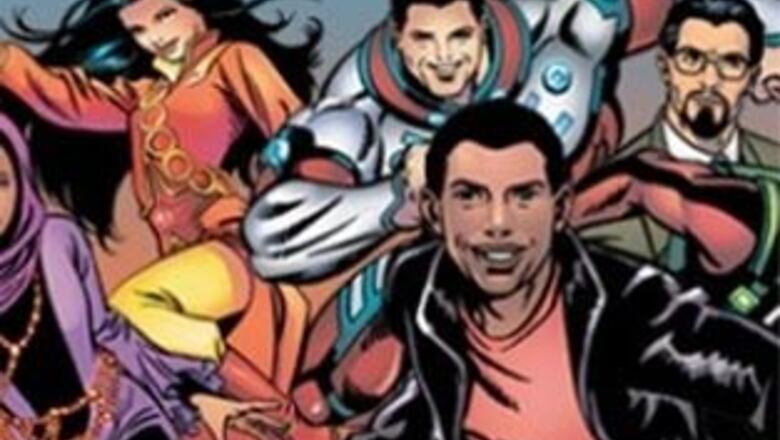
views
India has its myths and epics and Amar Chitra Katha. Scandinavian countries have Norse Gods who spew thunder and breathe fire. The US invented superheroes because it didn’t have any in its history. But the Islamic world never had a single superhero who captured children’s imaginations and tried to make the world a better place. Until now.
Naif Al-Mutawa (38), a Kuwait-based entrepreneur, was troubled by people’s perceptions of Islam. They saw Osama bin Laden, a war-ravaged Iraq and a bombed out Afghanistan. Mutawa needed to show people that Islam was a modern religion that encouraged creativity. Out of this rubble of thoughts he gave birth to THE 99: Super-heroes inspired by the 99 traits of Allah who fight evil and injustice.
Already available in 20 countries and translated into eight languages, THE 99 series sells one million copies annually. Sure, that’s small fry compared to DC Comics’ sale of about 70 million copies a year, but it’s a good start for al-Mutawa and his Teshkeel Media Group.
His super heroes come from across the world. There is Widad – The Loving from the Philippines, Darr – The Afflictor from US and Noora – The Light from the UAE to name a few. And they are getting the world’s attention: THE 99 series is now being turned into an animation film. Nestle wants its characters on its bottled water sold in West Asia.
Al-Mutawa holds a Ph.D in clinical psychology and spent 10 years working with war victims in New York. Some patients were Iraqi citizens who were tortured by Saddam Hussein during the Gulf War. “These were the people who saw their hero [Saddam Hussein] turn villain,” recalls Al-Mutawa.
In a world where Islam was grappling with existential dilemmas, he worried over this absence of role models. Most superheroes and children’s programmes came from the West (think Superman, Batman) or Japan (Pokemon) and did not cater well to Muslim sensitivities, he recalls. Every Ramzan saw a couple of programmes being taken off air because they hurt Islamic sensitivities. When 9/11 happened, Al-Mutawa decided to find a way to “take back Islam from its hostage takers”. Thus was born THE 99 — a young Muslim father’s attempt to provide heroes for his four growing sons.
You can see where Al-Mutawa gets his inspiration from. As a kid, he grew up reading Nancy Drew and the Hardy Boys as he shuttled between the US and the Gulf. “Our stories are about tolerance, respect and teamwork,” in a world that is global and connected, he says. And the world has taken notice. Forbes has identified THE 99 as one of the “Top 20 Trends” sweeping the globe. Time, Newsweek, BBC and the Wall Street Journal have covered his characters.
Al-Mutawa has been writing stories since he was 10 and has already published many story books for children. In THE 99, he combines his story-telling skills and psychologist’s sensitivity to build the mythology. THE 99 begins in the 13th century when Mongols invaded Baghdad and destroyed its library that housed all the knowledge and wisdom in that part of the world. However, knowledge keepers managed to transfer all the wisdom on to 99 gemstones or noors which were later scattered all over the world.
As a result, THE 99 have heroes from all over the world who work with each other. No one carries weapons, gender equality is maintained and they always work in teams of three, reinforcing the Islamic significance of the number three. Significantly, THE 99 have their headquarters in Paris, in a country where the hijab is banned in schools. Twenty-three heroes have debuted from 23 countries, with many more to come.
Al-Mutawa insists that while the characters are inspired by Islam, the story plot is non-religious. His heroes are ordinary citizens who stumble upon their super-powers when they come into contact with a noor. All his characters have alter egos. No one indulges in religious activities. Fatta – The Opener is a disenchanted dishwasher at a restaurant in Indonesia when he lands a noor on a belt buckle at a second-hand store.
Al-Mutawa doesn’t have the luxury his superheroes have. He has had some tough moments. When THE 99 debuted, Saudi Arabia banned the comic. “They were worried if my comics would carry the wrong message,” he says. He managed to get funding from an Islamic bank where scholars vet every investment on its religion compliance. This helped open doors in Saudi Arabia and other places.
In the West, Al-Mutawa has to look for an audience beyond Muslims. He is now partnering with Time Warner where heroes like Wonder Woman, Batman and Superman will come together to collaborate with THE 99 to save the world.
His firm, Teshkeel Comics, has tied up with the UK-based Endemol International to co-produce and distribute an animated series based on THE 99. The 22-minute, 26-episode animation series is being produced by a Chennai-based firm, Sanraa Media, with the script being written in Hollywood and voice getting recorded in Canada.
Plans are on to add new revenue streams — Teshkeel opened up its first theme park on the lines of Disney in Kuwait and has plans to open six more in the next six years. Growing on the back of freelancers and outsourcing partners, Teshkeel has 17 full-time employees and has raised roughly $25 million in five years.
Al-Mutawa knows he has been successful in giving a generation of children a set of superheroes they badly needed. He refers to an old article which talked about a Hamas supporter making money selling a children’s album with pictures of suicide bombers as heroes.
“Only a father’s love could have understood the need,” he says.




















Comments
0 comment